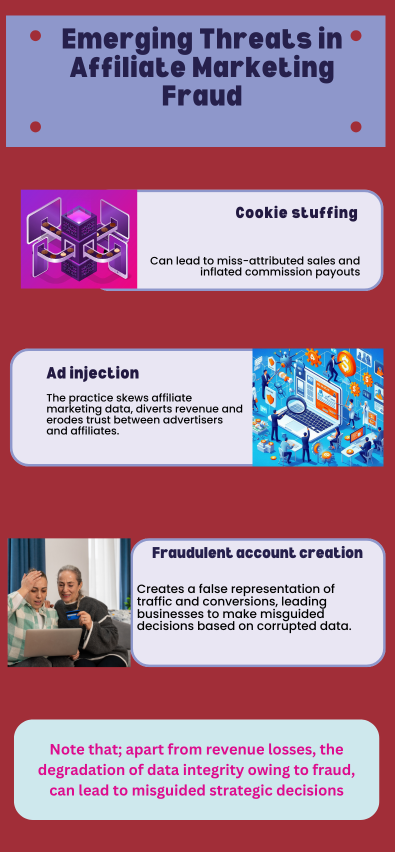You will discover the latest affiliate fraud trends, learn how to shield your business, and explore emerging threats as well as cutting-edge prevention strategies.

Introduction
In the ever-shifting landscape of affiliate marketing, staying current with the latest fraud trends is crucial. This is not just about protecting revenue; more importantly, it is about safeguarding the trust customers place in businesses. In this post, I will outline the current trends disrupting the field of affiliate marketing.
Understanding why it is crucial to keep a close eye on affiliate marketing fraud is simple: the integrity of an entire marketing strategy could be at stake. Letting your guard down can cost businesses significant amounts of money and potentially damage their reputation. As a matter of fact, advertisers lose about 20% of the total marketing budget to losses caused due to affiliate marketing scams
As you navigate through the complexities of affiliate marketing, understanding and identifying the latest fraud trends becomes an instrumental part of ensuring business integrity and financial health. Recognition of these patterns is the first step to arming oneself against potential risks.
With this backdrop of ongoing vigilance, let us move into deciphering the emerging threats that are defining the current state of affiliate fraud. I will dissect the new tactics fraudsters are using and, more importantly, discuss how they affect businesses and their operations. This should prepare you to better protect your affiliate program’s longevity.
Emerging Threats in Affiliate Marketing Fraud
Affiliate fraud is not a static challenge; it morphs with alarming sophistication, always finding new ways to disrupt honest efforts. Let us explore some of the newest and most concerning fraud tactics that have recently emerged.
Cookie stuffing
At the heart of affiliate fraud are practices like cookie stuffing, wherein fraudsters force a user’s computer to store cookies from unrelated sites. This tactic can lead to miss-attributed sales and inflated commission payouts. According to a 2022 Cheq report, cookie stuffing accounted for approximately 17% of all affiliate fraud cases, and resulted in 3.4 million of dollars in lost revenue. It must be higher now.
Ad injection
Ad injection involves inserting unauthorized ads or links into a webpage. This practice not only skews affiliate marketing data but also diverts revenue and erodes trust between advertisers and affiliates. A report published by Juniper Research revealed that a staggering 22% of all digital advertising spend in 2023 was attributed to ad fraud, which was a whopping $84 billion! Moreover, the same report paint a dire picture; for it was projected that if a current trend were to continue, losses attributed to ad fraud would reach $172 billion by 2028.
This projection does differ much from that made by Statista, that estimated that the costs related to digital advertising fraud worldwide would increase within the five years between 2023 and 2028, from 88 billion to 172 billion U.S. dollars.
Fraudulent account creation
Another pressing concern is fraudulent account creation. Bad actors use automated bots to create multiple fake accounts, which then mimic genuine activity to earn commissions fraudulently. This creates a false representation of traffic and conversions, leading businesses to make misguided decisions based on corrupted data.
The impact on businesses is both immediate and long-term. While revenue loss is the most apparent consequence, the degradation of data integrity can lead to misguided strategic decisions. Moreover, reputational damage can dissolve partnerships that took years to build. Consider this: as businesses invest considerable resources in driving genuine traffic to their sites, fraudsters can siphon off the return on investment, making businesses to be effectively pouring their effort into a leaking vessel.
Embracing Technology: The Vanguard Against Fraudulent Affiliates
In the relentless fight against affiliate marketing fraud, technology has become our strongest ally. With fraudsters becoming more sophisticated, it is IMPERATIVE that businesses deploy the most advanced tools to stay one step ahead.
Real-time detection systems
Real-time detection systems analyze patterns and flag irregularities as they occur. These vigilant sentinels never sleep, rather, they are always scanning for the slightest hint of suspicious activity. For instance, sudden spikes in traffic or unusual conversion patterns trigger immediate scrutiny.

Blockchain
Blockchain’s transparency and immutability provide fort-like security for affiliate transactions. These decentralized ledgers can be audited by anyone, drastically reducing the chances of falsified records or hidden transactions.
AI-driven anomaly detection tools
Anomaly detection is defined as the process of identifying any deviation from normal behavior. It could be an indication of a technical glitch or a potential loophole for attacks. In the context of information technology monitoring, anomaly detection is when a metric behaves differently when compared to how it generally behaves or how it behaved in the past.
AI-driven anomaly detection tools have shown promising results in identifying fraud. These systems learn from historical data to spot deviations that could indicate fraudulent activity. Typically, the AI and ML engine studies behavior over a prescribed period to understand regular patterns. Based on these insights, it identifies when there is a deviation from the observed behavior and notifies you about it.
The AI and ML engine also predicts future trends based on these observations. Site24x7’s AI-powered monitoring tool, is an AI-powered tool, that can be used for this very task. It uses the Robust Principal Component Analysis (RPCA) and matrix sketching algorithms to detect anomalies.
Biometric verification and two-factor authentication
These methods add another layer of defense, making it harder for imposters to fake identities or manipulate systems. While not infallible, they significantly deter fraudsters. However, it is vital not to grow complacent. The technology is only as good as its implementation and the human insight that guides it. Regular updates, continuous education, and a proactive approach to fraud management remain non-negotiable for businesses serious about safeguarding their affiliate programs.
Adapting to Changes: Emerging Strategies in Affiliate Fraud Prevention
If we have learned one thing about the battle against affiliate marketing fraud, it is that the landscape is perpetually shape-shifting. This means that your strategy should not be limited to setting up of defenses. As much as this is very important, the dynamic nature of the affiliate fraud threat should always be in the forefront. Static measures will not hold up against the sophisticated tactics that are coming down the pipeline.
Staying informed is paramount in this ever-evolving landscape. Regularly update your knowledge base by subscribing to industry newsletters and fraud prevention blogs. Attend webinars and conferences focused on affiliate fraud, and actively participate in industry forums and discussion groups. This constant influx of information will keep you abreast of the latest trends and emerging threats.
Implement a system of continuous monitoring and adjustment to stay ahead of fraudsters. Conduct weekly reviews of affiliate performance metrics and set up automated alerts for unusual activity patterns. Regularly update your fraud detection rules based on new insights gained from your monitoring efforts and industry updates. This proactive approach allows you to respond swiftly to new threats as they emerge.
Investing in ongoing staff training is crucial for maintaining a strong defense against fraud. Conduct monthly internal workshops on the latest fraud tactics and encourage team members to obtain relevant certifications. Create a culture of vigilance by rewarding fraud detection efforts. Well-trained staff serve as your first line of defense, capable of spotting and addressing potential issues before they escalate.
Finally, cultivate strong relationships with affiliate networks and partners. Establish clear communication channels for reporting suspicious activity and share best practices and insights with trusted partners. Collaborate on joint fraud prevention initiatives to create a united front against fraudulent activities. These relationships not only strengthen your individual efforts but also contribute to a more secure affiliate marketing ecosystem as a whole.
By embracing these strategies, you not only safeguard your revenue but also uphold the integrity of the affiliate marketing ecosystem. Remember, your vigilance and dedication to updating and upgrading your fraud prevention strategies are cornerstones of resilient operations in this dynamic digital arena..
Conclusion
As we look back at the shifting sands of affiliate marketing fraud, I encourage you to maintain sharp awareness and take a proactive stance. By staying informed and adapting swiftly, you are not only protected, but also empowered to thrive in this challenging landscape.
Are you in need for more?
Navigating the complexities of affiliate marketing and fraud prevention can be overwhelming, especially for those new to the field. If you are looking to deepen your knowledge and build a successful, fraud-resistant online business, I highly recommend exploring the Wealthy Affiliate training platform.
Wealthy Affiliate offers a comprehensive free starter package that provides clear, actionable knowledge on building successful online businesses. Their training covers not only affiliate marketing strategies but also crucial aspects of fraud prevention and ethical business practices.
Take the next step in your journey towards a secure and profitable online business. Enroll in Wealthy Affiliate’s free starter package today and arm yourself with the knowledge and tools you need to succeed in the ever-evolving world of affiliate marketing. Do not let fraud hold you back – empower yourself with education and start building your online empire today!

Thanks for reading, and I hope to see you on the path to affiliate marketing mastery. If you have any questions or comments, please leave them in the box below and you will be answered within 24 hours
Good luck!
Joseph Hawumba


